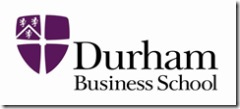Working smarter
Today I'm very pleased to introduce my first guest blogger, Colin Ashurst from the Durham Business School in this the first of a series he will be posting on officerocker. I've known Colin for many years and I'm looking forward to working with him over the next few months. I'll let him introduce himself:
Over the last 25 years I have had a lot of fun working at a range of organisations. First of all I qualified as a Chartered Accountant, then I moved into consulting with what is now PwC. Other roles included a number of years at Asda as part of the senior IT management team and 5 years at Microsoft as a Strategy Consultant. I’m now at Durham Business School teaching, researching, and learning in the real world as CIO for the School. My passion in all this is helping individuals and organisations realise the potential of Information Systems – for me that’s about people and skills, as well as business innovation and transformation.
Improving the Effectiveness of Knowledge Work
Is there a problem?
It was about three years after I started work that I remember the first PC’s. Do you remember all those strings of commands to get a Lotus 123 spreadsheet to print? It was a number of years before I had my own PC and then later my own laptop at work. I wonder what we used to do all day? Now, most of us spend a large part of each day using a laptop or a desktop PC. I probably spend 25-30 hours a week using a PC. I know that isn’t unusual.
What do we do during all those hours each week using the PC? Most of us use Outlook for email and spend a lot of time using Word, PowerPoint and Excel; I also use Visio, Project, Groove and SharePoint as well as Internet Explorer. I have constant access to the Internet. I don’t use any ‘line of business’ applications, but to support my teaching and research I do make a lot of use of the Internet to access electronic libraries. These are the tools of my trade as a ‘knowledge worker’.
In an important sense we are all information or knowledge workers now. This PC and Internet technology has changed how we work dramatically. I happen to be writing this at home, but I’m keeping in touch with work using Outlook Web Access. We are much more effective in many ways than we were before the PC. I think of my first week working at Microsoft, my line manager was able to follow up an email request from me and we had approval from the Director of our business group in Australia and the co-coordinating manager in Redmond within 24hours. At quite a different level, I’ve noticed the impact of PowerPoint 2007 on my presentations. I need to use slides a lot in presentations and teaching – I like to try and use diagrams not just endless bullet points. The new SmartArt feature can probably save me 30 minutes or more a slide in preparation time and I was very competent with PowerPoint anyway. And it also has an impact on quality – its challenging me to think in a different way about communication.
Peter Drucker argued strongly that improving the effectiveness of knowledge work is the greatest challenge for managers in the 21st century. He stressed that there is a need and an opportunity for the same sort of huge improvement that there was in the effectiveness of manufacturing in the 20th century. Have we met this challenge already with all these new tools?
No way! There have been enormous changes and improvements, but there is a huge amount more we can do to take advantage of the powerful tools we already have available to us. Also, the pace of innovation is accelerating – so there are many more opportunities to come.
Organizations have barely begun to tackle the challenge of improving the effectiveness of knowledge work. Some provide up to date PCs and the latest software, many do not. Very few (I haven’t found one yet and have tried hard), provide adequate support and advice for users to realize the potential of all these powerful tools. Most of us, spending most of the working week using these tools, only know a fraction of their capabilities that would be valuable to us. The evidence from Microsoft that 80% of new features requested for Office are already in the product supports this. The IT function of an organization is usually happy as long as the technology works, the Human Resources function may pay for some formal training. But no one really tackles how individuals, teams and departments can exploit the full potential of these tools to improve the effectiveness of information and knowledge workers.
In this brief note I’ve started to explore the problem. I hope to come back to this topic and start to explore different aspects of the solution. We are actively researching this area and we are also ‘eating our own dogfood’ as we try to Work Smarter at the Business School. We are very keen to work with other individuals and organizations who share our passion and determination to improve the effectiveness of knowledge work
Senior Teaching Fellow: Information Systems and Business Transformation
Chief Information Officer
Durham Business School, University of Durham
Comments
Anonymous
June 28, 2007
Darren Strange aka The Office Rocker has a new guest blogger, Colin Ashurst from Durham Business SchoolAnonymous
June 28, 2007
Darren Strange aka The Office Rocker has a new guest blogger, Colin Ashurst from Durham Business SchoolAnonymous
July 12, 2007
It's my fault for not posting this sooner not Colin's and thanks to Mark who nagged me about it todayAnonymous
July 12, 2007
It's my fault for not posting this sooner not Colin's and thanks to Mark who nagged me about
